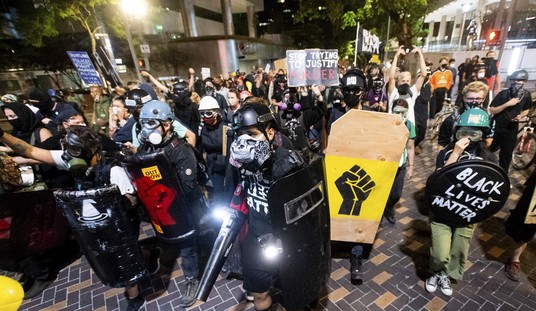If this was a film from the 1980s, it would end in a dance-off, right? Kevin Bacon and William Zabka would break it down, this time on cellphone video, vying for the heart of Molly Ringwald. Alas, this time the dance is much more lethal, and neither Donald Trump nor Xi Jinping will simply concede after a killer spin on the floor.
A killer spin on the courtroom floor? Maybe:
President Donald Trump on Thursday issued executive orders banning U.S. transactions with Chinese tech firms Tencent and ByteDance.
Tencent owns Chinese messaging app WeChat, and ByteDance is the Beijing-based parent company of the widely popular short video-sharing app TikTok.
The ban will take effect in 45 days and may attract retaliation from Beijing.
While the scope of the ban remains unclear, the executive orders said that after 45 days, Secretary of Commerce Wilbur Ross “shall identify the transactions” that will be subjected to the prohibition.
TikTok has long been suspected of datamining for Beijing as well as famous for its popularity among younger users, but the WeChat app is somewhat less well known. The New York Times calls it “China’s bridge to the world,” a way for ex-pats to stay connected to friends and family back home. It also offers such a comprehensive experience that the NYT notes it “does more than any app rightfully should,” which should be a warning in and of itself:
With much of the Chinese internet locked behind a wall of filters and censors, the country’s everything app is also one of the few digital bridges connecting China to the rest of the world. It is the way exchange students talk to their families, immigrants keep up with relatives and much of the Chinese diaspora swaps memes, gossip and videos.
Now, that bridge is threatening to crumble.
Late Thursday, the Trump administration issued an executive order that could pull China’s most important app from Apple and Google stores across the world and prevent American companies from doing business with its parent company, Tencent. Light on details, the decree could prove cosmetic, crushing or something in between.
If enforced strongly when it takes effect in 45 days, the order will take dead aim at China’s single most groundbreaking internet product, which 1.2 billion people use every month. An effective ban on the app in the United States would cut short millions of conversations between investors, business partners, family members and friends. The threat alone will likely start a new chapter in the deepening standoff between China and the United States over the future of technology.
However, the NYT also notes farther down in the article that the WeChat app is already known to be more malicious than TikTok:
Within China, the app is heavily censored and monitored by a newly empowered force of internet police.
Outside China’s borders, the app has become a key conduit for the spread of Beijing’s propaganda. Chinese security forces have also regularly used WeChat to intimidate and silence members of the Chinese diaspora, including minority Uighurs seeking to raise awareness of harsh crackdowns in their homeland in western China.
The executive order tellingly spends much more time outlining the threat from WeChat than TikTok:
WeChat, a messaging, social media, and electronic payment application owned by the Chinese company Tencent Holdings Ltd., reportedly has over one billion users worldwide, including users in the United States. Like TikTok, WeChat automatically captures vast swaths of information from its users. This data collection threatens to allow the Chinese Communist Party access to Americans’ personal and proprietary information. In addition, the application captures the personal and proprietary information of Chinese nationals visiting the United States, thereby allowing the Chinese Communist Party a mechanism for keeping tabs on Chinese citizens who may be enjoying the benefits of a free society for the first time in their lives. For example, in March 2019, a researcher reportedly discovered a Chinese database containing billions of WeChat messages sent from users in not only China but also the United States, Taiwan, South Korea, and Australia. WeChat, like TikTok, also reportedly censors content that the Chinese Communist Party deems politically sensitive and may also be used for disinformation campaigns that benefit the Chinese Communist Party. These risks have led other countries, including Australia and India, to begin restricting or banning the use of WeChat. The United States must take aggressive action against the owner of WeChat to protect our national security.
TikTok owner Bytedance suggested that it might challenge Trump to a dance-off in US federal court (via Google Translate):
We have made it clear that we are willing to negotiate a solution with the US government so that we can continue to serve our users, creators, business partners, employees, and American society. However, in this process, the U.S. government has never followed due process of law or acted in accordance with the law. The source of the “report” cited by the executive order is unknown or unproven, and there is no substantive basis for the concern that the app “may” be used for false propaganda activities. In addition, TikTok’s questioned data collection behavior has always been a common practice in thousands of mobile apps around the world. We have made it clear that TikTok has never shared user data with the Chinese government, and has never reviewed content upon request. In fact, we have disclosed our review policy and algorithm source code through the establishment of a Transparency Center. No technology company of the same type has committed to fulfilling this responsibility. We even stated that we could sell our US business to a US company.
This executive order would undermine the trust of global companies in the U.S. rule of law commitments. For decades, it has attracted foreign investment and promoted US economic growth. The order set a dangerous precedent that violated freedom of expression and open markets. We will make every effort to take all feasible measures to ensure that the rule of law is not abandoned and that our company and users are treated fairly. If the US government cannot treat us fairly, we will resort to the US courts.
Courts are likely to give Trump some leeway on this, especially considering the nature of the risks cited in the EO. When it comes to trade, national security, and foreign policy, the executive reaches its zenith of legitimate authority, although that’s not to say it’s entirely unlimited. However, Bytedance now faces a class-action lawsuit from angry parents of its users over TikTok’s data-privacy practices, which means it might be a lot less enthusiastic about the “rule of law commitments” it cites in this statement sooner rather than later.
This is a long-overdue move in constraining China’s economic and propagandistic interference in the US. Will it make Xi think twice about jousting with Trump? The WeChat ban will cut a lot deeper than the loss of its TikTok dance-off platform. It might be time to exit the barn and let the local kids have their dance to themselves.








Join the conversation as a VIP Member